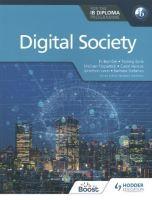

BLOGS > MARCH 27, 2023
BY BARBARA STEFANICS


One of the major dilemmas that has surfaced since the release of the Digital Society Guide and the publishing of our Digital Society coursebook is how to organize the topics and teach the learning activities and assessments in a well-organized course of study.
There are many dimensions that need to be considered. The first consideration relates to whether the class consists of:
All these possibilities contribute to a unique course outline.
The next challenge is organizing the sequence and depth of discussion of the three Cs: Concepts, Content, and Contexts. The course should be introduced through the Digital Society framework and by using simple inquiries and real-world examples that include digital technologies familiar to the students. Section 1: Understanding Digital Society and Section 2: Concepts from the Digital Society textbook demonstrate this approach and are aligned with the Digital Society Guide.
Next, students need an understanding of the various digital technologies (Section 3: Content) and need to investigate relevant real-world examples and the impacts of those digital technologies on individuals and communities. This is covered in more depth here than in Section 2: Concepts, and each topic in Section 3: Content relates to specific contexts and concepts. The digital technologies should not be studied in isolation.
At this point, Section 4: Contexts allows for the study of seven topic areas in any order. Each topic includes real-world examples that integrate Context, Content, and Concepts and ensures that all aspects of the Digital Society framework have been addressed. If the class consists of SL and HL students, the order of the topics for the SL/HL Core may need to be aligned with topics in Section 5 of HL Extension: Challenges and Interventions.
After the basic course outline is determined, it will need to be further developed by considering:
The Digital Society coursebook is organized so that topics from the various sections can be considered sequentially or integrated as needed in the course outline.
Here is my sample course outline for consideration. You might find it useful.
In considering the course outline, you need to remember to indicate:
I look forward to us collaborating and sharing our course outlines with the network of Digital Society educators!

Barbara Stefanics
Barbara Stefanics is an IB teacher, examiner, workshop leader, DP consultant and course reviewer, and a DS and technology faculty member for My IB.
Classroom Libraries Part 1: Organizing & Designing Your Classroom Library
April 12, 2024
We all know that books are essential for learning, and as educators we buy them, collect them, receive them, but then what? We have some great and not-so-great books in our classrooms, and it’s hard to decide what goes into...
Read more
The Top 5 Strategies for Cost-Effective IT Management in K-12 Schools and Districts
April 9, 2024
Introduction IT management has become much more than just keeping the lights on in the computer lab. It's about creating an environment where technology enhances learning without breaking the bank. Let's dive into the top five strategies that will not only save you pennies but...
Read more
Enjoy free digital access to books releasing this summer!
April 8, 2024
Follett partnered with Penguin Young Readers Group and NetGalley* to provide digital access to upcoming fiction titles through August 27. Get early access to favorite topics – novels in verse, mystery, realistic fiction, friendship – then preorder the books you...
Read more
Future-Proofing Education: Why Cloud Hosting Is Key to Technological Advancement
April 8, 2024
In an era where technology evolves at lightning speed, the education sector cannot afford to lag. For K-12 school districts, maintaining a robust, scalable, and secure IT infrastructure is not just about keeping pace with current trends but ensuring they...
Read more
Spring into the new season with the most sought out titles!
March 25, 2024
Well-known librarian Shannon McClintock Miller has selected 13 elementary titles from Capstone Publishing as must-reads for your readers. Including fiction and nonfiction and a variety of genres, these books focus on interesting topics and subject matter that students want to...
Read more
March 25, 2024
Your K-5 students will love the latest installments in several wildly popular, acclaimed series coming out this spring. Check out these highly anticipated titles by powerhouse authors! Shop Now Always AnthonyBy Terri LibensonAvailable: May 7, 2024This eighth book in the New York...
Read more